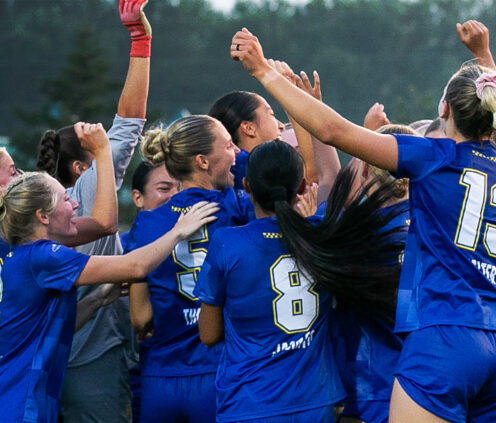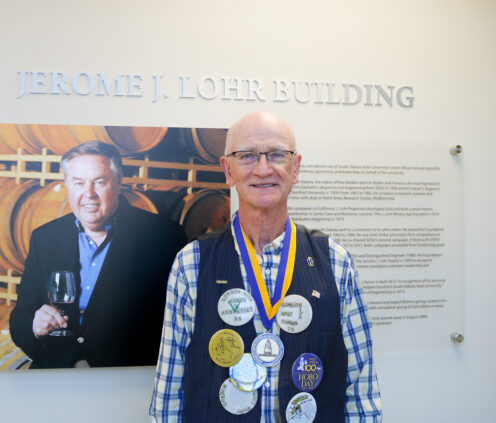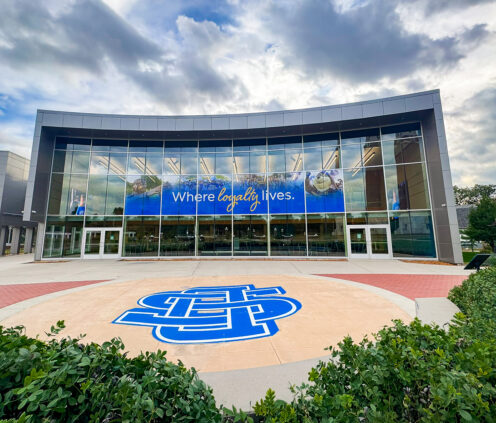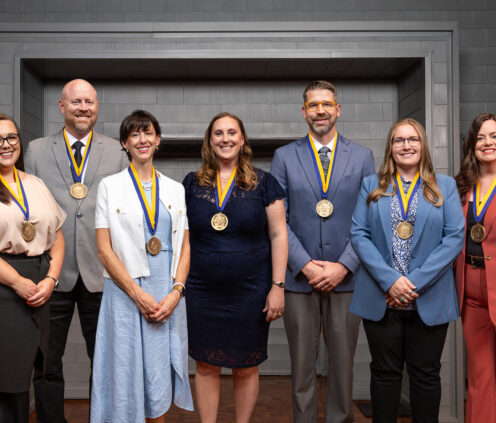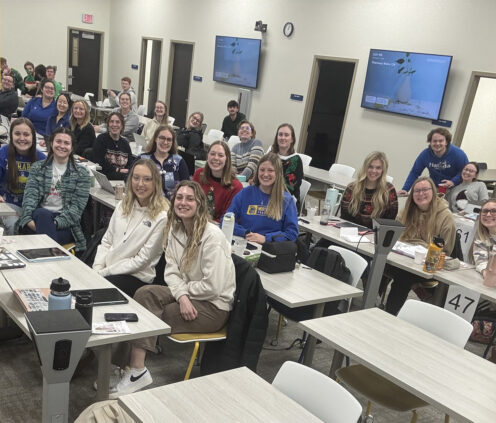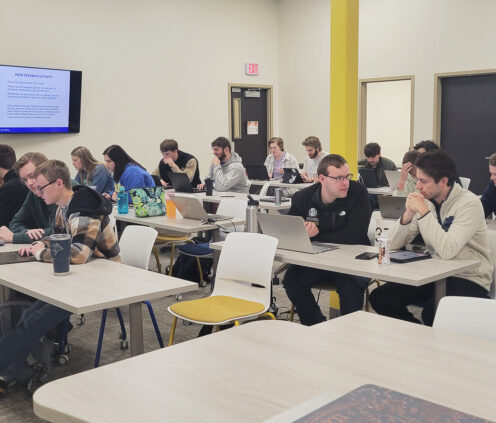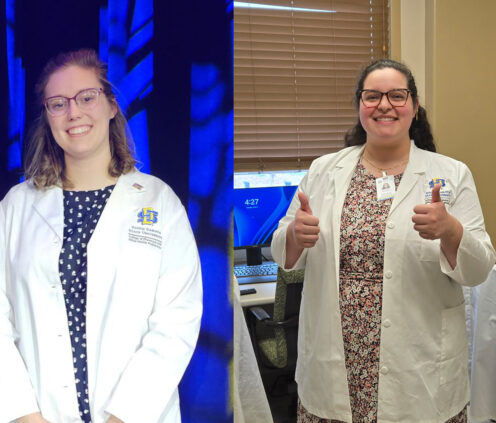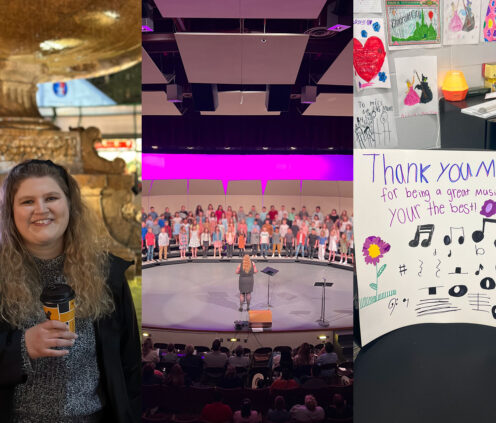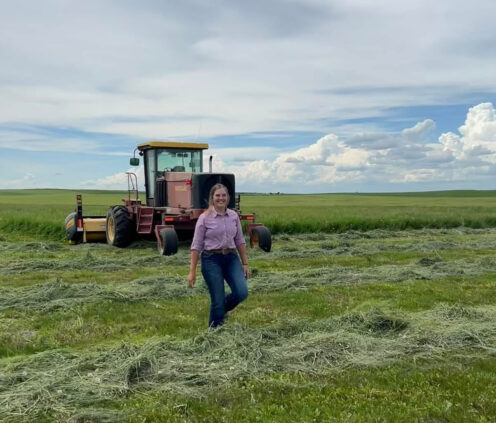Trailblazing Teachers: The First of Many
The first class of elementary education majors graduated from South Dakota State in May 2025.
With the many different hats teachers wear and the many different responsibilities they juggle, it’s difficult to summarize the role of an educator in just a few words.
It’s their job to remain curious while fostering curiosity, to ask their own questions and answer those of others, and to be lifelong learners while developing learners for life. It’s a balancing act with the weight of the future on their shoulders, charged with shaping the students who will someday shape the world. At their core, it’s a teacher’s job to make a difference – and the first-ever Jackrabbit graduates of the elementary education program are poised to do just that.
Until a few years ago, South Dakota State offered an early childhood education bachelor’s degree to its students interested in becoming teachers, preparing them to specialize in children spanning from birth to age 8. To bridge the gap for other ages not covered within early childhood education, SDSU participated in a co-op program with Dakota State University, wherein Jackrabbits pursued a degree that required an additional 24 credit hours of elementary education, along with field placements managed by DSU. The partnership entailed a blend of curriculum from both institutions that relied on online coursework to meld their respective programs, and the result often led to greater time required for students to earn their degrees.
That all changed in May 2023, when the Board of Regents approved SDSU to establish majors in elementary education and special education. Made a reality by the generosity of private donors, students in the education arena at State immediately pivoted to the new program offerings and jumped at the chance to build skills and competencies for a wider age bracket.
Though the change took effect only a few short years ago, the College of Education and Human Sciences is already noticing a great deal of interest in the new majors available.
Anne Karabon - Wendell and Marlys Thompson Director of the School of Education, Counseling and Human DevelopmentThe remarkable enrollment growth and enthusiasm we've witnessed affirms that these programs are meeting a vital need, ensuring more classrooms will benefit from the preparation and Jackrabbit spirit our graduates bring to their communities.
Anne notes that the addition of the latest degrees offers an elevated experience for SDSU’s teacher preparation program, creating vital pathways and expanding opportunities for students to make a meaningful impact.
As of May 2025, the school saw its first cohort of graduates earn their degrees in elementary education, making history for the university.

Diplomas in hand, the small (but mighty) group of 11 alumni are ready to take their place in the workforce, expanding the Jackrabbit margin of excellence in classrooms around the state, the region, and beyond.
Before the recent grads departed, we seized our chance to hear from a few members of the cohort as they prepare to set out on their next adventures, blazing a trail for generations of Jackrabbit teachers to follow in their calling to make a difference.

ALYSSA CHASKA
Alyssa Chaska has known she wanted to be a teacher ever since she was a little girl. Citing a difficult home life growing up, she remembers her own teachers serving as a safe space of stability and support. Wanting to be that same source of comfort for each of her own students, Alyssa sought out the teaching program co-opted with DSU. When the SDSU elementary program became available, she pivoted immediately to the new course offerings. Throughout her years studying elementary education, Alyssa believes the small class sizes, close friends, and knowledgeable instructors made all the difference in her experience as a Jackrabbit. While it’s impossible to narrow down all that she’s learned to just a few key lessons, she’s particularly grateful for her skills in curriculum planning, the science of reading, and effective classroom management – all imparted by a roster of faculty willing to help her, inside the classroom and out.
Following graduation, Alyssa will take her talents to Dakota Prairie Elementary, teaching first grade in Brookings. “My biggest takeaway is the importance of building strong, supportive relationships with not just students, but also their parents,” she reflects. “Fostering a safe and supportive environment is crucial to having a successful classroom.”

BRIANNA DUERRE
For Brianna Duerre, the elementary education program at SDSU was the perfect opportunity to not only get in the classroom faster, but to focus on the age range she wanted to teach. She recalls feeling a drive to teach starting at a young age, stemming from the leadership positions she held in 4-H Club. Originally part of the DSU co-op program, Brianna made the switch to elementary education as soon as she could. Though she admits being in the first class had its uncertainties, the staff’s personable nature and willingness to lend support left her with an experience that will shape her career for life.
Degree in hand, Brianna plans to move to Rapid City, where she’ll teach fourth grade at Valley View Elementary. When asked to pinpoint one of her greatest takeaways from her education at SDSU, she believes placing an emphasis on the importance of asking questions will guide her time as a teacher and influence the young students in her classroom. “As teachers, we want to create lifelong learners, so as educators, we, too, should be lifelong learners. A great way to do that is by asking questions, staying curious, and relying on others to provide feedback.”

NICOLE MCCABE
Nicole McCabe’s first experience with teaching happened not in a classroom, but in an ice rink. In high school, she often helped her dad coach a youth hockey team, and it was then that Nicole realized the impact teachers can have on children. Like the rest of her cohort, she was involved in the existing co-op program at SDSU but felt that the online classes made it difficult to capture the full experience. Once she immersed herself in the new elementary education program, she appreciated how the small class sizes gave her the opportunity to make connections with fellow future educators. Nicole also saw the value in learning from professors who were current teachers, and, in effect, using her professors’ experiences to build her own.
Thanks to her degree, Nicole has accepted a teaching position in Mankato, Minnesota, not far from where she grew up in Madison Lake. When she returns to the area, she’ll be equipped for a career of impact and inspiration. “Our professors and the other education staff want to see each of us strive to be the best educators possible. I cannot wait to use what I have learned from State and apply it to my own classroom.”

MACY RIPPENTROP
Macy Rippentrop believes it’s a teacher’s role to help children grow academically, socially, and emotionally – and that’s exactly what she intends to do following graduation. Macy was inspired to pursue teaching based on the positive influence and lasting impression of her own teachers growing up, and she aimed to be that for others someday. After transitioning from the DSU co-op program, she thrived with the small size of her cohort, who she explains have grown into lifelong friends and an inherent support system. Macy describes the faculty of the program as professors who not only taught, but modeled what it means to be a thoughtful, responsive educator. Together, the first cohort of elementary education majors built an environment where the group learned to take risks, learn from mistakes, and celebrate one another’s progress.
Once she embarks from SDSU, Macy intends to pursue a teaching position in the Sioux Falls area. “I love the curiosity and energy that young students bring into the classroom, and I believe the early years are critical in shaping a child’s love for learning. Pursuing a degree in elementary education felt less like a decision and more like following a path I was always meant to take.”

